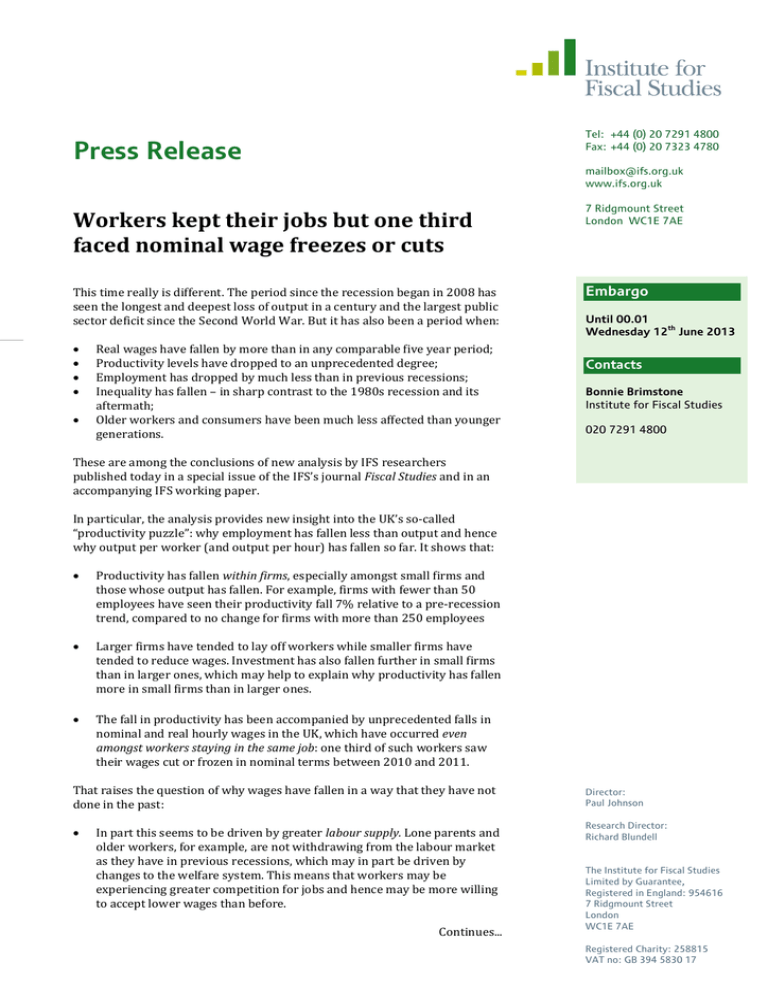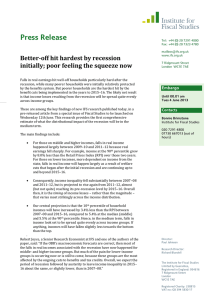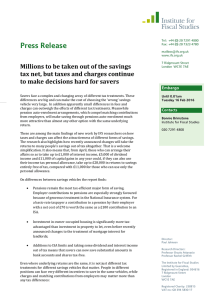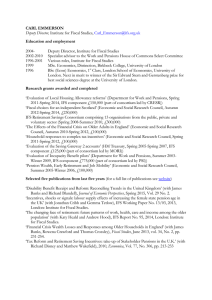Press Release
advertisement

Tel: +44 (0) 20 7291 4800 Fax: +44 (0) 20 7323 4780 Press Release mailbox@ifs.org.uk www.ifs.org.uk Workers kept their jobs but one third faced nominal wage freezes or cuts 7 Ridgmount Street London WC1E 7AE This time really is different. The period since the recession began in 2008 has seen the longest and deepest loss of output in a century and the largest public sector deficit since the Second World War. But it has also been a period when: Embargo Real wages have fallen by more than in any comparable five year period; Productivity levels have dropped to an unprecedented degree; Employment has dropped by much less than in previous recessions; Inequality has fallen – in sharp contrast to the 1980s recession and its aftermath; Older workers and consumers have been much less affected than younger generations. Until 00.01 Wednesday 12th June 2013 Contacts Bonnie Brimstone Institute for Fiscal Studies 020 7291 4800 These are among the conclusions of new analysis by IFS researchers published today in a special issue of the IFS’s journal Fiscal Studies and in an accompanying IFS working paper. In particular, the analysis provides new insight into the UK’s so-called “productivity puzzle”: why employment has fallen less than output and hence why output per worker (and output per hour) has fallen so far. It shows that: Productivity has fallen within firms, especially amongst small firms and those whose output has fallen. For example, firms with fewer than 50 employees have seen their productivity fall 7% relative to a pre-recession trend, compared to no change for firms with more than 250 employees Larger firms have tended to lay off workers while smaller firms have tended to reduce wages. Investment has also fallen further in small firms than in larger ones, which may help to explain why productivity has fallen more in small firms than in larger ones. The fall in productivity has been accompanied by unprecedented falls in nominal and real hourly wages in the UK, which have occurred even amongst workers staying in the same job: one third of such workers saw their wages cut or frozen in nominal terms between 2010 and 2011. That raises the question of why wages have fallen in a way that they have not done in the past: Director: Paul Johnson Research Director: Richard Blundell In part this seems to be driven by greater labour supply. Lone parents and older workers, for example, are not withdrawing from the labour market as they have in previous recessions, which may in part be driven by changes to the welfare system. This means that workers may be experiencing greater competition for jobs and hence may be more willing to accept lower wages than before. Continues... The Institute for Fiscal Studies Limited by Guarantee, Registered in England: 954616 7 Ridgmount Street London WC1E 7AE Registered Charity: 258815 VAT no: GB 394 5830 17 …continued In addition, fewer workers are unionised or covered by collective wage agreements now than in the past. Wage growth since 2008 has tended to be lower amongst workers who were not covered by such agreements, and they were more likely to experience nominal wage freezes in 2011. Commenting on these findings, Claire Crawford, Programme Director at IFS and Managing Editor of Fiscal Studies, said: “The falls in nominal wages that workers have experienced during this recession are unprecedented, and seem to provide at least a partial explanation for why unemployment has risen less – and productivity has fallen more – than might otherwise have been expected. To the extent that it is better for individuals to stay in work, albeit with lower wages, than to become unemployed, the long-term consequences of this recession in terms of labour market performance may be less severe than following the high unemployment recessions of the 1980s and 1990s.” ENDS Notes to Editors: 1. This analysis has been published as part of a special issue of the IFS’s journal Fiscal Studies on the microeconomic consequences of the recession in the UK, and in an accompanying working paper. We are grateful to the ESRC via the Centre for the Microeconomic Analysis of Public Policy for supporting our work. 2. For embargoed copies of the analysis or other queries, please contact: Bonnie Brimstone at IFS: 020 7291 4800 / 07730 667 013, bonnie_b@ifs.org.uk. 3. The findings on productivity and wages will be discussed in more detail at an event to launch the special issue of Fiscal Studies at the IFS offices from 10am to 11.30am on Wednesday 12 June 2013. The embargo for this work will have passed by then, but if you would like to attend, then you would be very welcome to do so. Please email events@ifs.org.uk if you wish to reserve a place. IFS hosts two ESRC Research Centres. The Institute for Fiscal Studies Limited by Guarantee, Registered in England: 954616 7 Ridgmount Street London WC1E 7AE




